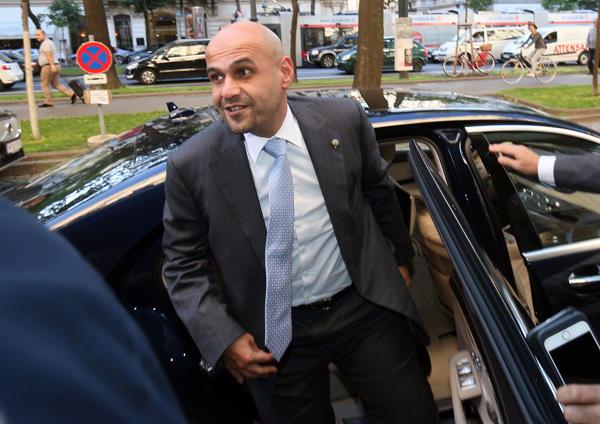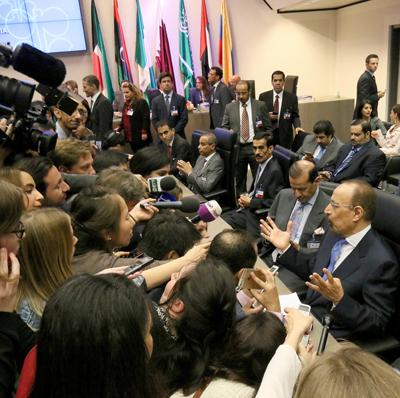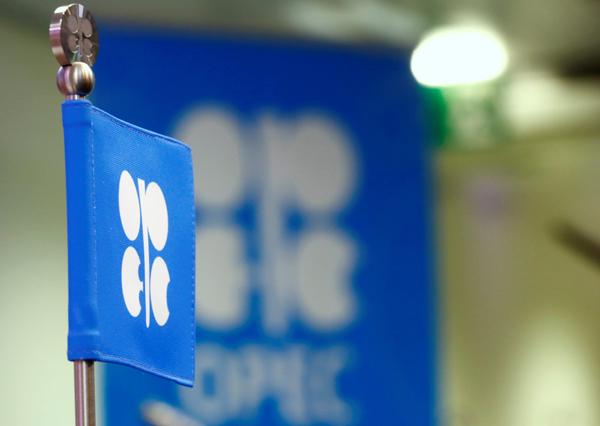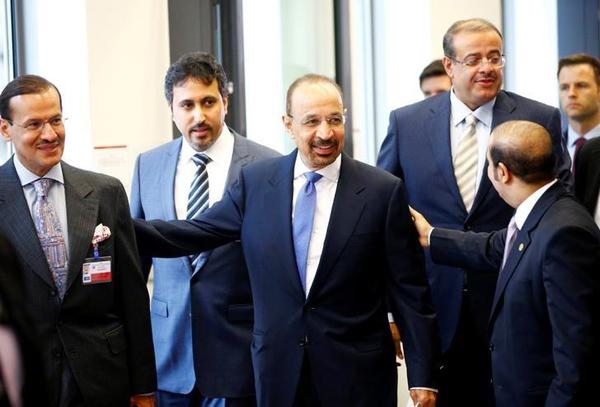You are here
Gulf OPEC members seek to revive global oil output deal
By Reuters - Jun 01,2016 - Last updated at Jun 02,2016

Anas Khaled Al Saleh, Kuwait's deputy prime minister, minister of finance and acting minister of oil, arrives at a hotel in Vienna, Austria, Tuesday (AP photo)
VIENNA – Gulf OPEC members including Saudi Arabia are looking to revive the idea of coordinated oil-output action by major producers when the group meets on Thursday including by establishing a new output ceiling inside the group, OPEC sources said.
Saudi arch-rival and OPEC member Iran said the country was not yet ready for an output pact, but several OPEC sources said the atmosphere inside the group had improved and a compromise was possible.
Any agreement between Riyadh and Tehran would be seen as a big surprise by the market, which in the past two years has grown increasingly used to clashes between the two political foes and a lack of OPEC decisions.
"The Gulf Cooperation Council is looking for coordinated action at the meeting," a senior OPEC source said, referring to a group combining OPEC's biggest producer Saudi Arabia and its Gulf allies Qatar, Kuwait and the United Arab Emirates.
Saudi Arabia effectively scuppered plans for a global production freeze — aimed at stabilising oil markets — in April. It said then that it would join the deal, which would also have involved non-OPEC Russia, only if Iran agreed to freeze output.
Tehran has been the main stumbling block for the Organisation of the Petroleum Exporting Countries (OPEC) to agree on output policy over the past year as the country boosted supplies despite calls from other members for a production freeze.
Tehran argues it should be allowed to raise production to levels seen before the imposition of now-ended Western sanctions over Iran's nuclear programme.
On Wednesday, Iran said its position had not changed and even though its exports were rising quickly it was too early for Tehran to join such a pact — meaning it would need an exemption, which Saudi Arabia has repeatedly resisted.
"Iran supports OPEC's efforts to bring stability to the market with fair and logical prices, but it will not commit to any output freeze," Iran's representative to OPEC, Mehdi Asali, was quoted as saying by Iranian oil ministry news agency Shana.
"The issue of output rationing can be discussed after the market stabilises," Asali said. Iranian officials had yet to arrive in Vienna.
Output ceiling
At its previous meeting in December 2015, OPEC failed to set any production policy including a formal output ceiling, effectively allowing its 13 members to pump at will in an already oversupplied market.
As a result, prices crashed to $27 per barrel in January, their lowest in over a decade, but have since recovered to around $50 due to global supply outages.
Those include declining output from US shale producers badly hit by low prices but also forest fires in Canada, militant attacks on pipelines in OPEC member Nigeria and declining output in Venezuela, also a member of the group.
On Wednesday, four OPEC sources said the group was likely to consider setting a new production ceiling.
Until December 2015, OPEC had a ceiling of 30 million barrels per day (bpd) — in place since December 2011.
OPEC currently produces around 32.5 million bpd. Any ceiling below that number would represent an effective production cut.
Three sources said the ceiling would need to be set substantially above 30 million bpd, but a final figure would likely require lengthy discussions.
"Even a 32 million bpd target would only ratify maximum production and not amount to a policy change. But it could be signalling surprise given the low expectations the market has for this meeting," said Robert McNally, president of the Rapidan group.
Oil recouped intraday losses to trade flat near $50 a barrel on hopes of possible compromises at Thursday's meeting.
The new Saudi energy minister, Khalid Al Falih, was due to meet fellow Gulf ministers later on Wednesday in a traditional gathering preceding OPEC.
Falih was the first OPEC minister to arrive in Vienna this week, signalling he is taking the organisation seriously despite fears among fellow members that Riyadh is no longer keen to have OPEC as an output-setting organisation.
Earlier on Wednesday, Falih met Venezuelan Energy Minister Eulogio Del Pino, who said in a statement that the two "agreed on the importance of OPEC as a major player in the oil market".
He also warned that supply outages have propped up prices in recent months but a global oil glut might build up again when missing barrels return.
"More than 3 million barrels are out of the market. When those circumstances are removed from the market, what's going to happen?" Del Pino told reporters in Vienna.
Related Articles
VIENNA – Saudi Arabia promised on Thursday not to flood the oil market with extra barrels even as OPEC failed to agree on output policy, wit
VIENNA/DUBAI — OPEC will debate an oil output cut of 4-4.5 per cent for all of its members except Libya and Nigeria next week but the deal's
DUBAI/LONDON — OPEC will probably revive talks on freezing oil output levels when it meets non-OPEC nations next month as top exporter Saudi



















